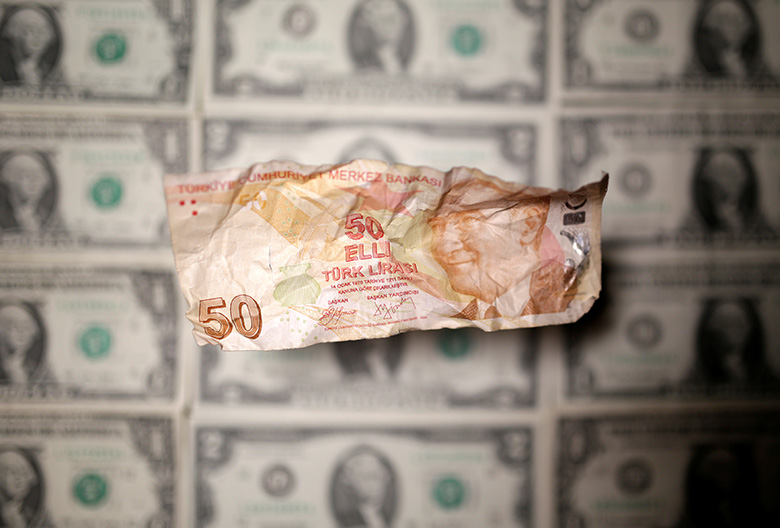Experts taking part in Euromoney’s Country Risk Survey took a dim view of Turkish prospects in 2018, resulting in a downgraded total risk score and lower investment ranking.
The pessimism was justified in August when the lira took a tumble on heightened tensions with the US, worsened by the country’s current account deficit and political risks undermining confidence in policymaking, including central bank independence.
Dipping to 59th out of 186 countries surveyed in Euromoney’s global risk rankings, according to provisional survey data for Q4 2018, Turkey plunged to within two-and-a-half points of tier four status – one of five tiered categories determining relative creditworthiness.
Euromoney is planning to release its full survey results, and review of risk trends in 2018, next week.
For Turkey, it was just the extension of a longer-term trend that has seen the country become increasingly risky over time:
Note: our programmers have developed a profitable forex robot with low risk and stable profit!
Action taken
Decisive action by the Central Bank of Turkey – raising its policy interest rate to an eye-watering 24% to stem the 40% currency depreciation – steadied the markets with the lira down by 28% against the dollar overall.
But not without inflation worsening and the economy slowing sharply.
Annual inflation has now fallen for two months, assisted by tax cuts and price discounting, but remains a hefty 20.3% as of December, after reaching a peak of 25.2% in October.
Forecasts from the European Commission signal GDP, which rose by an estimated 3.8% last year in real terms, will contract by 1.5% in 2019 after slowing sharply to 1.6% year-on-year in Q3 2018, from 5.3% in Q2 (revised).
Economic risk indicators pertaining to growth and currency stability were downgraded last year, with capital access tightened.
Yet the risk experts are not able to pronounce the worst is over, a fact underlined by another attack on the lira as the markets began the new year targeting currencies with political and economic vulnerabilities.
Confidence is undermined by the US Federal Reserve remaining in tightening mode, an economy in disrepair, and local elections (in March) adding to political uncertainty.
This removes the option of loosening monetary policy until inflation improves more substantially and confidence in Turkey can be restored.
One of Euromoney’s survey contributors, ABN Amro, is similarly predicting a 1.5% contraction of GDP this year, with three quarters of negative growth, as the lagged impact of currency depreciation, high inflation and borrowing rates slows consumption.
Positive possibilities
Nora Neuteboom, an economist with ABN Amro sees potential for two main upside risks. One concerns Turkey’s EU accession talks creating impetus for upgrading the customs union.
This would achieve improved liberalization of goods and services, and public procurement, with Turkey also keen to make progress on a visa-free regime.
A second would be real progress on structural reform, with the aid of the IMF’s expertise.
Negative probabilities
Yet, there are also downsides, including the (admittedly low-risk) prospect of premature monetary policy-loosening, resulting in another round of lira destabilization.
Another concerns bank stability, one of the risk factors downgraded in Euromoney’s survey in 2018.
“The tougher economic circumstances, tightening financing conditions and weakening of the lira will further increase the pressure on Turkish banks,” says Neuteboom.
“Due to regulatory forbearance, capital ratios and NPL ratios are not accurately depicting the true quality of banks’ balance sheets.
“Any sudden liquidity-related issues at a large Turkish bank will therefore weaken confidence in the banking system as a whole and may undermine credit growth even further.”
Naturally, this would put the emphasis on government to provide financial system support, worsening fiscal metrics, and in a worst-case triggering a bigger banking crisis.
The general government deficit widened to around 2.5% of GDP last year, according to the European Commission.
Plans to tighten fiscal policy will otherwise see it narrow in 2019 to 1.9%, combatting the rise in the gross debt burden above 31% of GDP, but these projections could be easily blown off course.
A related risk concerns the state-owned Halkbank, which US authorities have accused of violating sanctions against Iran, throwing open the wider issue of deteriorating foreign relations, given Washington’s support for the Kurds and a cosy military alignment developing between Ankara and Moscow promoting arms sales and control over Syria.
Confrontation with the US could escalate, notably concerning the S-400 anti-aircraft weapon system deliveries by Russia and Turkey’s operations across its border, says Danske Bank, noting various downside risks for lira.
The central bank’s monetary easing, driven by political pressure and worsening macro factors, also presents downside risks, along with Fed tightening.
All in all, a bumpy year ahead appears to be in store for Turkish investors, until macro stability is restored.


 Signal2forex.com - Best Forex robots and signals
Signal2forex.com - Best Forex robots and signals




